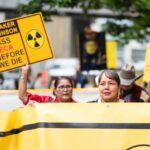The banality of death by nuclear power
By Kennette Benedict | October 13, 2011
Scientists estimate that 1,000 people will die from cancer as a result of their exposure to radiation from the Fukushima Daiichi disaster. This number is often contrasted with the 20,000 who died in the March 11 earthquake and tsunami that caused the nuclear debacle — presumably to suggest that the 1,000 deaths are less significant and should not be used to justify a nuclear power shutdown. The Argonne National Laboratory’s Hussein Khalil for one made just such a comparison in April, when he argued for the safety of US nuclear power, noting that the health consequences of the Fukushima plant thus far “pale in comparison” with the toll exacted by the natural disasters.
In fact, when faced with questions about the safety of nuclear power plants, experts often suggest that the public doesn’t understand how to think about risk; if they did, the public would see that the rewards from nuclear energy — economic development, employment, reduced carbon emissions — outweigh the deaths from the few accidents that have occurred, particularly in comparison with other energy sources. A 2007 study in the medical journal The Lancet, for example, found that deaths and illnesses attributed to the use of coal in energy production far outpace those caused by the use of nuclear energy. But why stop there? Some 30,000 people die in car crashes every year and yet Americans continue to drive — now that is risky. Depending on the analogy, one might be tempted to conclude that nuclear power carries no risk at all. Apparently, the public is just very unsophisticated when it comes to comprehending risk.
If so, at least we aren’t alone. In the aftermath of the terrorist attacks of September 11, 2001, when nearly 3,000 people died, the US government sacrificed 6,000-plus military personnel and many thousands more civilians in Iraq and Afghanistan and spent more than $1 trillion to ensure that such an attack never happens again. One might wonder just how sophisticated government officials are when it comes to thinking about risk. After all, the same logic should apply, right? The government should understand that the rewards of living in an open society are worth the risk of deaths and injury from an occasional terrorist attack — whether in Oklahoma City or New York — just as the economic and environmental rewards are worth the risk of death and injury associated with nuclear power.
Whatever the thinking, rationale, or analogy, one thing is clear: Terrorism is fought at any cost; but nuclear accidents are deflected. The billions of dollars spent and lives sacrificed in pursuit of eradicating terrorism is an enormous price to pay in response to the deaths of 3,000. So why won’t the government pour those kinds of financial and human resources into fixing safety problems at nuclear power plants to ensure that another 1,000 people or more do not die from radiation exposure in the wake of a future accident?
How can we make sense of these different ways of thinking about death? Radiation deaths from nuclear industry accidents quickly lead to talk of risks and rewards, costs and benefits. But with deaths from political violence, the discussion immediately turns to justice and retribution — no matter the toll. In the liberal democratic tradition, we learn that each individual life is unique, that each person’s vote counts, that one death diminishes us all, and that the death by execution of even one innocent person is an outrage that cannot be tolerated in civilized society. How then can we reconcile the nearly incalculable value of each individual life with a cost-benefit analysis that can sacrifice those lives for the benefits of economic development, higher standards of living, and technological progress?
There seems to be a distinction between “political deaths” and “economic deaths.” Political deaths are repugnant because there is intention in the death — an intention to kill out of hatred, malice, or dangerous ideological beliefs. Economic deaths are more acceptable because there is no intention to kill. These sacrificed lives are part of the cost of doing business — the price of the technological advances that benefit the rest of us. The difference between political and economic death hinges on intention.
Clearly, nuclear power companies do not intend to kill anyone, and they work hard to design, construct, and operate reactors as safely as possible. But far more needs to be done: Facilities are outdated, unsecured, and the US government still doesn’t have a safe solution for spent-fuel storage. And — despite nuclear power’s apparent safety compared with earthquakes, coal-mining, and driving — the extreme danger of the radioactive material in power plants and of nuclear technology in and of itself is so well-known that the US government was prompted (at the industry’s urging) to enact provisions that protect the nuclear industry from bearing the full burden of such inherently risky nuclear operations. The Price-Anderson Act limits industry’s liability in the case of accidents, and the 1982 Nuclear Waste Policy Act charges the federal government with responsibility for permanently storing nuclear waste. Meanwhile, the other burdens of nuclear power — cancer deaths from radiation exposure — are borne not by the government, but by individuals and their families.
And so we return to the question of how to understand and treat these deaths. Nuclear power companies do not intend to kill, but the outsized risks associated with nuclear power are plain to see. Shouldn’t we put as many resources into the prevention of these economic deaths as we do political ones? How do we reconcile our beliefs in an individual’s right to safety and security with a public discussion that privileges economic gain from a dangerous technology over human lives? Perhaps the problem should be cast in its starkest terms: What if Fukushima had been caused by terrorists? What if terrorists — not natural disasters — had cut off electrical power to the plant, causing meltdowns and radiation exposure that resulted in 1,000 deaths?
It’s likely that governments would be doing everything within their power to ensure it never happened again. So, why not start now — before the next Fukushima?
Together, we make the world safer.
The Bulletin elevates expert voices above the noise. But as an independent nonprofit organization, our operations depend on the support of readers like you. Help us continue to deliver quality journalism that holds leaders accountable. Your support of our work at any level is important. In return, we promise our coverage will be understandable, influential, vigilant, solution-oriented, and fair-minded. Together we can make a difference.
Topics: Columnists, Nuclear Energy














